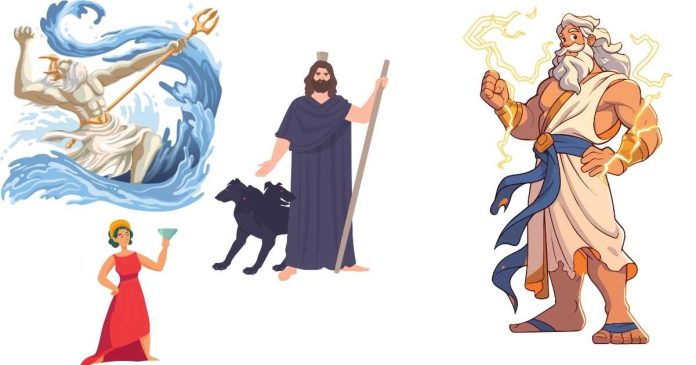Zeus, the king of the gods in Greek mythology, is a prominent figure in ancient Greek religion and storytelling. He is part of the Olympian pantheon and is often associated with thunder, lightning, and justice. As a central figure, Zeus’s family dynamics play a significant role in many myths. Zeus has five siblings: two brothers and three sisters. Here’s a closer look at his family and their relationships.
Zeus’s Siblings
Zeus and his siblings are the children of the Titans Cronus and Rhea. According to mythology, Cronus swallowed all of his children at birth to prevent them from overthrowing him, as he feared a prophecy that one of them would take his throne. However, Rhea managed to save Zeus, who later freed his siblings from Cronus’s stomach after overthrowing him.
Brothers
- Poseidon:
- Poseidon is the god of the sea, earthquakes, and horses. He is one of the major Olympian gods and plays a crucial role in many myths. Poseidon’s domain is the ocean, and he wields the powerful trident.
- Relationship with Zeus: Poseidon is often depicted as a loyal ally to Zeus, though there are instances of rivalry between the two, especially over control of certain territories.
- Hades:
- Hades is the god of the underworld and the ruler of the dead. Unlike Zeus and Poseidon, Hades does not reside on Mount Olympus and is often portrayed as more distant and brooding.
- Relationship with Zeus: Hades and Zeus have a relatively neutral relationship, though myths sometimes hint at tension due to the grim nature of Hades’ domain compared to Zeus’s lofty position as ruler of the heavens.
Sisters
- Hestia:
- Hestia is the goddess of the hearth, home, and domesticity. She is considered one of the gentlest and most non-confrontational deities.
- Relationship with Zeus: Hestia gave up her seat among the Olympians to maintain peace and avoid conflict, reflecting her harmonious nature.
- Demeter:
- Demeter is the goddess of agriculture, harvest, and fertility. She is particularly well-known for the myth of her daughter, Persephone, who was abducted by Hades.
- Relationship with Zeus: Zeus and Demeter share a complex relationship. He is the father of her daughter Persephone, and their interactions often center around Persephone’s fate.
- Hera:
- Hera is the goddess of marriage, women, and childbirth. She is also Zeus’s wife and queen of the gods, making their relationship both familial and marital.
- Relationship with Zeus: Their marriage is infamous for its tumultuous nature, as Zeus’s infidelity often leads to conflict with Hera. Despite this, Hera remains a powerful figure and a central part of Zeus’s life.
The Role of Zeus’s Siblings in Mythology
Zeus’s siblings play significant roles in Greek mythology, often serving as central figures in various myths. Together, they form the core of the Olympian gods, each with their own domain and influence over the world and humanity.
- The Division of Realms: After defeating their father, Cronus, and the Titans, Zeus and his brothers divided the world among themselves. Zeus took the sky, Poseidon the sea, and Hades the underworld, while the earth and Mount Olympus were left as common ground.
- Cooperation and Rivalries: While the siblings often cooperate in maintaining cosmic order, their relationships are also marked by occasional conflicts, power struggles, and personal dramas, which form the foundation of many Greek myths.
Zeus has five siblings—Poseidon, Hades, Hestia, Demeter, and Hera—each of whom plays a vital role in Greek mythology. Their relationships with Zeus are intricate, encompassing alliances, rivalries, and familial bonds. Together, they represent the rich and dynamic family structure of the Greek gods, influencing the myths and legends that continue to captivate audiences today.


